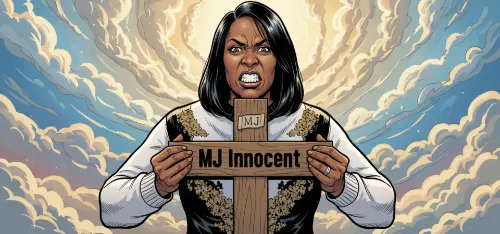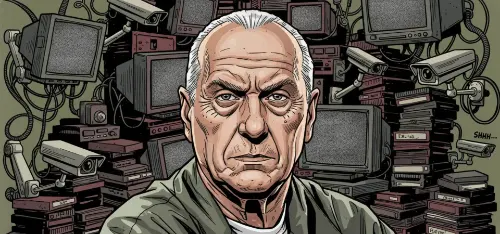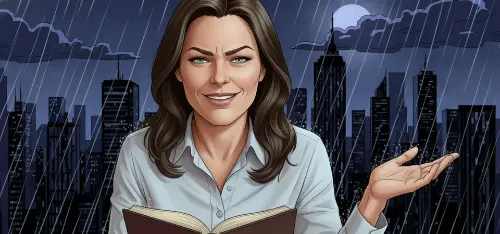Danny Wu Celebrates Young Girls Watching His Film — But Should He?

Nov 26, 2019
On 24 November 2019, Square One director Danny Wu shared a celebratory tweet featuring a photo of himself with two preteen girls in Beijing. According to his post, the picture was taken shortly after the film's Beijing premiere, which had taken place just a few days earlier.
Wu explained that the girls—aged around 11 or 12—had persuaded their mother to take them to the screening, describing them as passionate Michael Jackson superfans. He tweeted:
These 2 6th graders convinced their mom to take them to the Square One Beijing premiere, and also claimed to be the youngest MJ super fans. They let me know that they even convinced their school to screen the 30th anniversary concert on the school's movie day. #Proud
At first glance, the tweet might seem like a heartwarming moment—a young filmmaker thrilled that two enthusiastic youngsters had taken an interest in his work. But that perception quickly changes once you consider the nature of Square One.
This is not a documentary about Michael Jackson’s music or cultural legacy. Instead, it focuses on the 1993 child sexual abuse allegations made by Jordan Chandler, which the film contends were part of an extortion attempt against Jackson.
To offer some context, the film contains claims such as:
- That 20 divisions of the FBI investigated Jackson at one time or another and found no evidence of wrongdoing, including no child pornography on his computers.
- That a psychiatrist on ABC News refuted the idea that Jackson exhibited the profile of a paedophile.
- That journalist Victor Gutierrez, author of Michael Jackson Was My Lover, had connections to NAMBLA, a paedophile advocacy group.
- That a semi-nude photo of Jackson’s nephew from the pop group 3T — reportedly showing pubic hair — was not considered indecent under the law.
- That June Chandler, Jordan’s mother, forced her son to spend time with Jackson.
- That Evan Chandler, Jordan’s father, was portrayed as an absentee parent who engineered an extortion scheme.
- That Evan drugged his son with Sodium Amytal to implant false memories.
- That LaToya Jackson’s public accusations were made under coercion by her abusive husband, Jack Gordon.
- And that Jordan Chandler's description of discoloration on Jackson’s genitals was based on a guess, informed by his father's discovery of Jackson’s skin condition, vitiligo.
These are weighty, emotionally charged, and highly complex claims—some of which edge into conspiracy theory territory. The documentary deals with subjects like drug use, allegations of child sexual abuse, graphic anatomical descriptions, psychological coercion, manipulation by the media, and even references to NAMBLA, a group notorious for its controversial advocacy. This is not casual viewing by any standard. It’s dark, unsettling, and mentally demanding content.
It goes without saying that such material is wholly inappropriate for a general child audience—particularly for children as young as 11. And let’s be frank: even if one were comfortable with children being exposed to this type of content, they simply lack the cognitive and emotional maturity to fully grasp or critically assess such complex themes.
When Leaving Neverland aired on Channel 4, it was broadcast after the 9 PM watershed—the threshold in UK television intended to protect children from potentially inappropriate or adult-themed content.
It’s hard to imagine director Dan Reed, or the film’s subjects, Wade Robson and James Safechuck, ever suggesting that children as young as 11 or 12 should view such a documentary. Nor is it likely that they would pose for photographs with children and share them publicly, celebrating their interest in a film that deals with such traumatic and deeply sensitive issues.
Let’s be fair: Danny Wu isn’t personally responsible for who attends public screenings of his film. That responsibility lies with the event organisers or cinema staff. Likewise, being photographed with young fans isn't inherently problematic—especially if the moment is spontaneous, respectful, and handled with care.
However, one element is harder to dismiss. Wu, as an adult and the film’s creator, made the deliberate choice to log into his Twitter account and share a photograph of himself standing beside two preteen girls. He didn’t just note their attendance—he proudly stated that they had watched and endorsed Square One.
This choice goes beyond simply acknowledging fans. It gestures towards a more troubling pattern, often seen among some of Michael Jackson’s most ardent defenders: a willingness to overlook the gravity of the subject matter in favour of reinforcing a particular narrative. In this case, that narrative was not only accepted by children, but effectively showcased through them—as if their support helped legitimise the film’s argument.



